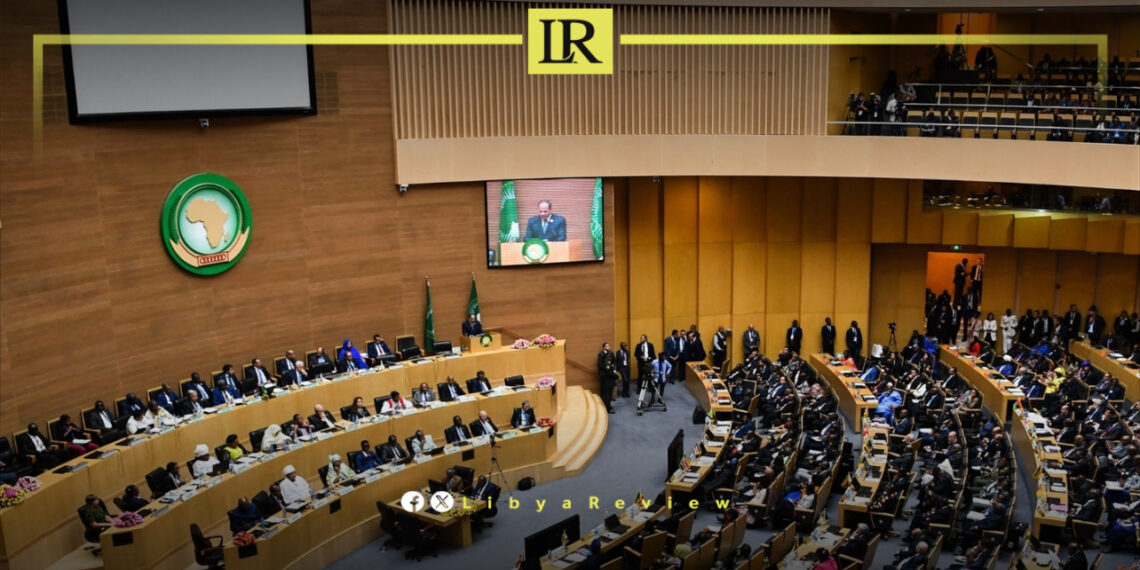A high-level delegation from the African Union (AU) visited Tripoli on Friday to assess the progress of Libya’s national reconciliation efforts and address the challenges facing the country. The delegation, led by Mauritanian President Mohamed Ould Cheikh El Ghazouani, included AU Commission Chairperson Moussa Faki and Jean-Claude Gakosso, Special Representative of Congo-Brazzaville’s President and head of the AU’s High-Level Committee on Libya.
The delegation met with Mohamed Al Mnifi, head of Libya’s Presidential Council, and discussed the steps taken so far in the reconciliation process and how to overcome the remaining obstacles. The Presidential Council stated that the meeting demonstrated the AU’s ongoing commitment to Libya’s unity, sovereignty, and stability, particularly in light of external interference.
Al Mnifi welcomed the visit, expressing gratitude for Africa’s continued support. He praised the efforts of the African Union, especially Congo’s leadership in the mediation process, and emphasized that the Presidential Council remains neutral in Libya’s internal conflicts. He reaffirmed the Council’s commitment to including all parties in the reconciliation process. Al Mnifi also supported the AU’s initiative to hold a meeting of Libyan stakeholders in Addis Ababa, aimed at facilitating national dialogue.
The AU delegation also met with the Prime Minister of the Government of National Unity (GNU), Abdul Hamid Dbaiba, who viewed the visit as a strong message of support during a critical period. Dbaiba reiterated his government’s commitment to overcoming the political and security challenges that have plagued Libya for years. He emphasized that Libya’s future depends on ending its transitional phase and moving directly to elections based on a transparent and solid legal framework.
The African Union delegation reaffirmed its full support for Libya during this crucial period. Mauritanian President El Ghazouani stressed that Libya’s stability is vital for the entire African continent and reiterated the AU’s commitment to helping Libya achieve national reconciliation and sustainable development. He added that Libya’s reintegration into the African Union is critical for the continent’s security and unity.
Moussa Faki, Chairperson of the AU Commission, echoed these sentiments, emphasizing that the African Union’s partnership with Libya extends beyond political matters to include economic development. He stressed that national reconciliation is the foundation for Libya’s future stability.
Jean-Claude Gakosso, Congo’s Foreign Minister and head of the AU’s Libya committee underscored the African Union’s role as a strategic partner in Libya’s path toward stability. He acknowledged Libya’s pivotal role in Africa and expressed optimism about the country’s future, stating that Libya’s stability is essential for Africa’s overall security.
Despite the positive messages from the African Union delegation, many observers remain cautious about the prospects for reconciliation, especially in western Libya, where militia control and instability persist. These regions continue to resist central authority, posing significant obstacles to achieving a unified state.
Analysts argue that for reconciliation to succeed, Libya must first unify its state institutions, including the military, and disband militias. Additionally, the state must regain full control over weapons and ensure the rule of law is applied equally throughout the country. Meeting these conditions, they say, is essential to bringing Libya’s factions to the negotiating table and achieving a genuine national reconciliation.
Libya has been mired in political chaos since the 2011 revolution that overthrew Muammar Gaddafi. The country remains divided between rival governments and militias, each vying for control. Despite numerous international efforts, Libya has struggled to achieve stability, and deep political divisions remain unresolved.
[1:38 PM, 10/12/2024] Hassanain Tayea: Libya, African Union, Reconciliation, Congo,
[1:40 PM, 10/12/2024] Mr Bilal Saleh: Last
[2:20 PM, 10/12/2024] Hassanain Tayea: Libya Reopens Geology Lab After 10-Year Hiatus
Libya’s NOC Reopens Geology Lab After Decade-Long Shutdown
On Saturday, Libya’s National Oil Corporation (NOC) announced the reopening of its geology laboratory in Qanfouda, Benghazi, following a decade of inactivity.
The facility, which belongs to the Arabian Gulf Oil Company (AGOCO), has undergone extensive renovation and is now fully equipped with modern technology, ready to support Libya’s efforts in oil and gas exploration.
In a statement, the NOC confirmed that the refurbishment and modernization of the lab were completed successfully. A team from the NOC’s Exploration Department, along with the Director of Geology, conducted an inspection visit to the facility, signaling its readiness for operations.
The reopening of this lab marks a key milestone in Libya’s efforts to revitalize its energy sector after years of disruption. The NOC praised the dedication of AGOCO’s management and staff in bringing the project to fruition, describing the lab as a critical asset in the country’s long-term oil exploration and production strategy.
The reopening of the Qanfouda geology lab comes at a time when Libya is seeking to expand its oil and gas production. Libya, which holds some of the largest proven oil reserves in Africa, is aiming to boost its production levels from the current 1.2 million barrels per day to between 2 and 3 million barrels per day in the coming years.
The Qanfouda lab will play an essential role in achieving these goals by providing advanced geological testing and analysis to guide oil and gas exploration efforts.
With the lab back in operation, Libya can more effectively utilize its untapped reserves of oil and natural gas. This is especially significant for the country’s economic recovery, as the oil sector remains the backbone of Libya’s economy. The NOC’s efforts to modernize and restore key facilities like the Qanfouda lab will contribute to both increasing production and attracting foreign investment.
As Libya rebuilds its energy sector, the NOC is also embracing sustainability and environmental responsibility.
In addition to traditional oil and gas exploration, the corporation is committed to incorporating renewable energy into its operations. The NOC has announced plans to integrate clean energy solutions and reduce the environmental impact of its activities, aligning with global efforts to transition to more sustainable energy sources.


